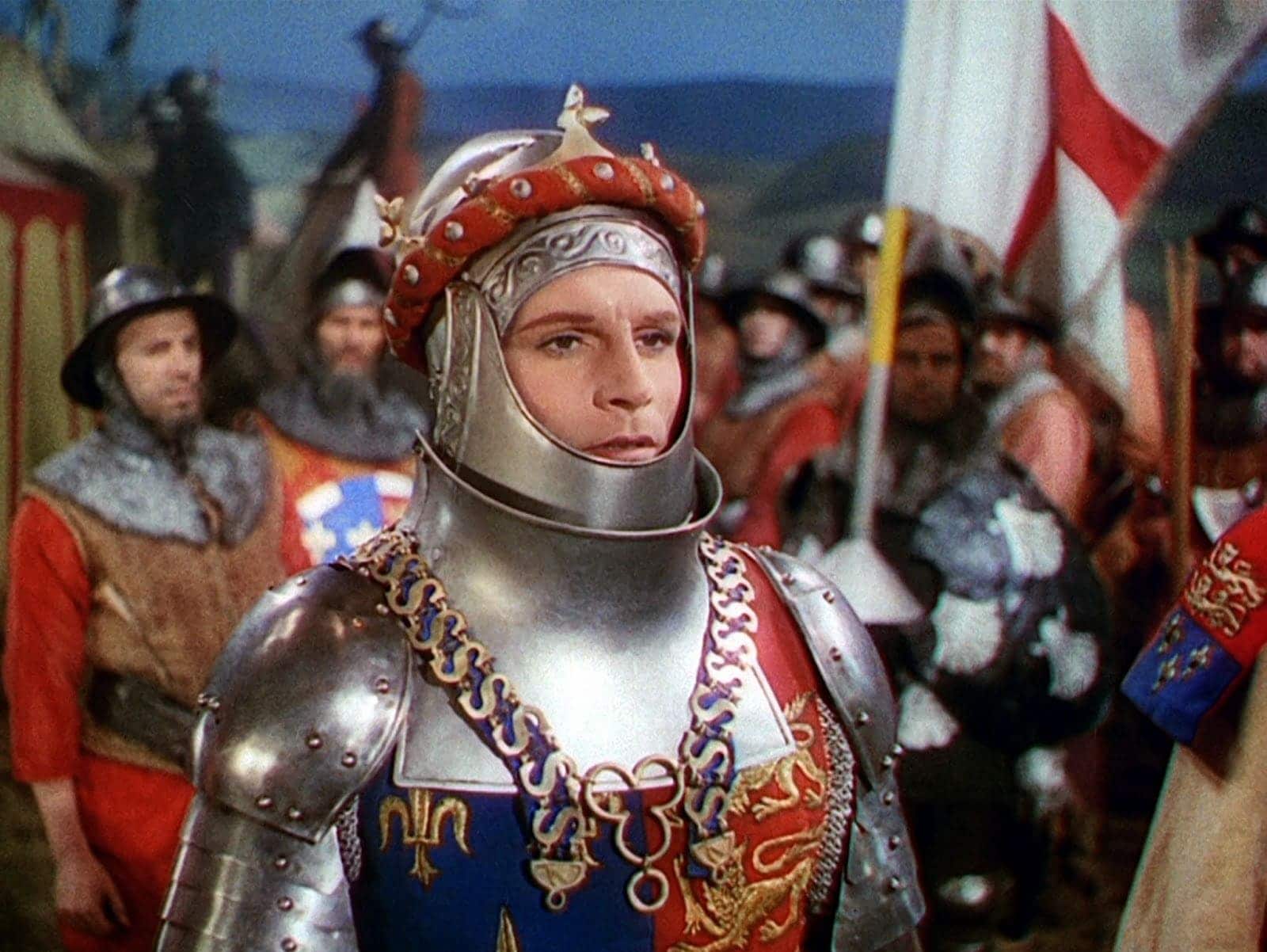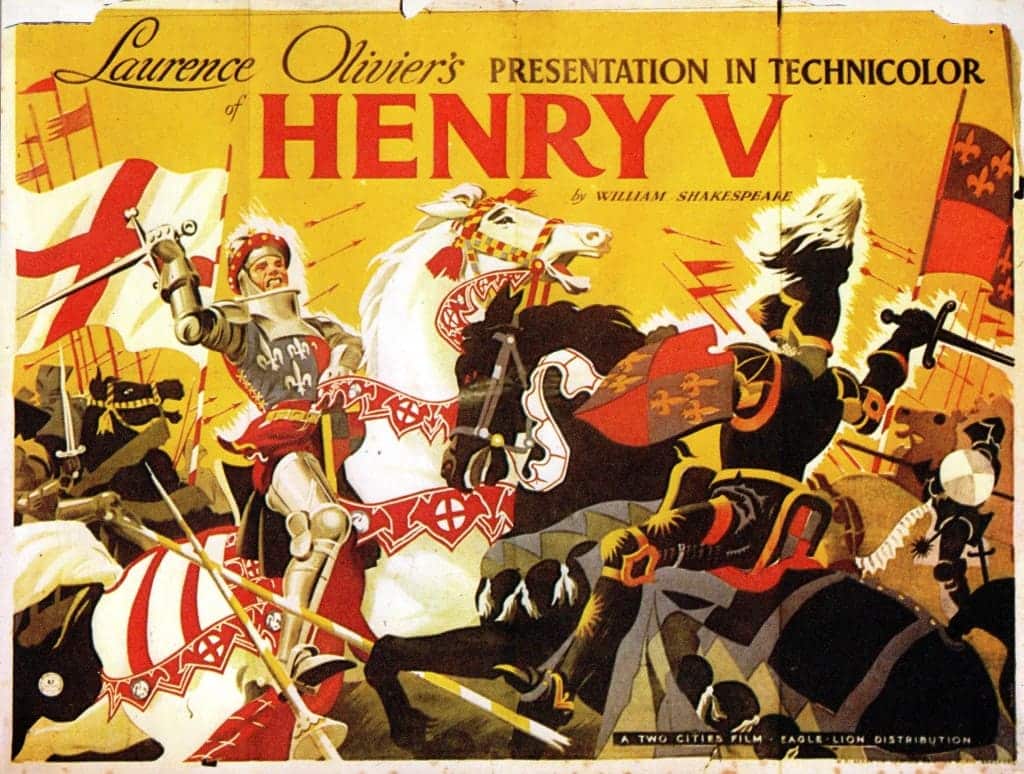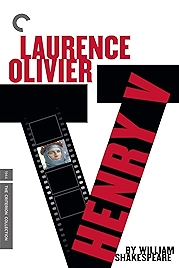Laurence Olivier didn’t want to direct Henry V. He was nervous about taking it on, what with having no actual directing experience and this being a film hoping to raise British morale during the Second World War (it was part financed by the government).
Olivier asked William Wyler, his Wuthering Heights director, to take it on. Wyler declined, and so, later, did Carol Reed. Both told him the same thing – if it’s Shakespeare then it’s got to be you.
Oliver screwed up his courage to the sticking place (to borrow a line from Macbeth) and got to work. The result is a magnificent hybrid of the theatrical and the cinematic, with the longest title ever to have been used in a film at the time – The Chronicle History of King Henry the Fift with His Battell Fought at Agincourt in France. Yes, Fift – no matter what Wikipedia or the IMDb are currently saying, that’s what it says on the screen (twice).
Olivier starts his story with a big panoramic view of 1600s London before zooming in to the “big wooden O” of the Globe theatre, where the play is about to be performed. Women are selling oranges, men are selling drinks, theatregoers are milling about, Olivier setting the scene before the play gets underway on the stage. And here’s Olivier himself, as an actor gulping nervously as he waits in the wings go on and play Henry V.
Sticking close to Shakespeare’s original text, Olivier gives us some background to what’s about to unfold – there’s a long-running squabble between England and France over various dukedoms in continental Europe, and the mischievous use of an inapplicable law by the French to decide on a vacant throne in their favour. This suddenly becomes a casus bellus when the French Dauphin ups the ante by insulting the English monarch with a gift of “treasure” which turns out to be a load of old balls, literally. Bubbling away behind all of this is the English monarch’s belief that he has a claim on the throne of France (in fact, to this day the English monarch still holds the title of Duke of Normandy).
This means war, and as the action shifts from England to France, Olivier ceases to be the actor playing Henry V and becomes Henry V himself. Meanwhile, Olivier the director is opening out the action and Henry V is leaving the stage behind to become a cinematic event, albeit one that deliberately never quite shakes off its origins – there are painted backdrops and perspective-shunted models standing in for countryside and towns right up to the big climactic battle. “Eke out our performance with your mind”, the Chorus (Leslie Banks) pleads with us as this leap is underway, a jokey reference to what’s happening on screen, where Olivier is laying it all out for us, no imagination necessary.
Here come the film’s best scenes, a protracted sequence set on the eve of battle, where in both armies men are nervously awaiting their fate. On the French side, the Dauphin (Max Adrian) is airily making claims about what he’s going to achieve in battle, while his generals roll their eyes behind him and mock him as much as they dare. These are gently comedic scenes, but there’s a subtle message coming across too – these men are babbling because they’re loose-bowelled with fear.
On the English side, Henry V disguises himself and goes among his men, gauging the mood and steeling them for battle. The next day he will steel them again, at full theatrical bellow this time, in two famous speeches – the rousing one ending “Cry ‘God for Harry, England and St George’ ” – and the St Crispin’s Day speech containing the lines “We few, we happy few, we band of brothers; for he today that sheds his blood with me shall be my brother; be he ne’er so vile.”
And on to the battle itself, not the finest sequences ever shot but Olivier does give us some idea of the scrappiness of combat on horseback – and in any case who wants to sit in a cinema and see men being killed in Normandy in 1415 when men are being killed for real in Normandy in 1944?
This being Shakespeare there are comic interludes, with Robert Newton getting the best of it, warming up his swivel-eyed, semi-drunk Long John Silver routine as Ancient Pistol, a soldier who’s all mouth and no breeches. He’s genuinely funny, something Shakespeare’s comic turns rarely are.
It’s shot by Robert Krasker (The Third Man and Brief Encounter) in Technicolor in a palette that is one notch below the gaudiness of 1939’s Robin Hood. William Walton follows that line with a superb soundtrack borrowing the strut of Erich Korngold’s Robin Hood score and adding English lyricism.
Olivier is majestic, all long-legged swagger, playing Henry V like Errol Flynn with a more commanding speaking voice, the compassionate, brave, wise, democratically inclined monarch who’s the antithesis of the French King Charles VI (Harcourt Williams), a dithery halfwit, and his appalling son, the Dauphin (Max Adrian), an effete preening ninny. For “French” read “Nazi” – Shakespeare was tweaked to add emphasis.
Is it brilliant? It is. Does it go on a bit too long? It does, with the final half hour – Henry’s courting of French Princess Katherine (Renée Asherson) – feeling as if it belongs to a separate story, but it does at least allow the battle sequence to resolve in a happy ending (two countries united by dynastic marriage), after which Olivier moves the action back to the south bank of the River Thames, his camera ascends back into the sky to take in the panorama of ye olde London, and the screen fades to black. We have been well entertained.
Henry V – Watch it/buy it at Amazon
I am an Amazon affiliate
© Steve Morrissey 2022


